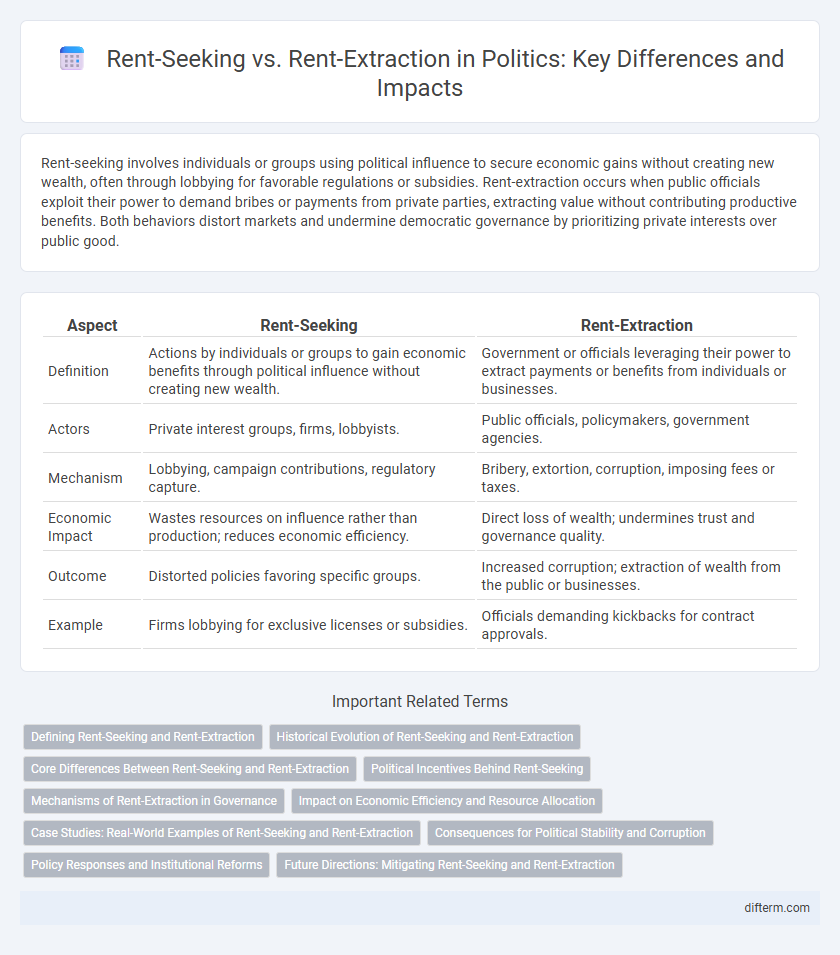Rent-seeking involves individuals or groups using political influence to secure economic gains without creating new wealth, often through lobbying for favorable regulations or subsidies. Rent-extraction occurs when public officials exploit their power to demand bribes or payments from private parties, extracting value without contributing productive benefits. Both behaviors distort markets and undermine democratic governance by prioritizing private interests over public good.
Table of Comparison
| Aspect | Rent-Seeking | Rent-Extraction |
|---|---|---|
| Definition | Actions by individuals or groups to gain economic benefits through political influence without creating new wealth. | Government or officials leveraging their power to extract payments or benefits from individuals or businesses. |
| Actors | Private interest groups, firms, lobbyists. | Public officials, policymakers, government agencies. |
| Mechanism | Lobbying, campaign contributions, regulatory capture. | Bribery, extortion, corruption, imposing fees or taxes. |
| Economic Impact | Wastes resources on influence rather than production; reduces economic efficiency. | Direct loss of wealth; undermines trust and governance quality. |
| Outcome | Distorted policies favoring specific groups. | Increased corruption; extraction of wealth from the public or businesses. |
| Example | Firms lobbying for exclusive licenses or subsidies. | Officials demanding kickbacks for contract approvals. |
Defining Rent-Seeking and Rent-Extraction
Rent-seeking involves individuals or groups attempting to increase their share of existing wealth without creating new value, typically through lobbying or manipulating public policy. Rent-extraction occurs when government officials leverage their regulatory or legislative power to obtain personal financial benefits from beneficiaries of public policies. Understanding these concepts is crucial for analyzing the dynamics between private interests and public governance in political economies.
Historical Evolution of Rent-Seeking and Rent-Extraction
Rent-seeking originated from economic theories in the 1970s, highlighting individuals or groups leveraging government regulations to gain economic benefits without value creation. Rent-extraction evolved as a concept emphasizing how political actors exploit their positions to extract economic rents through coercion or manipulation of policy environments. Historically, rent-seeking reflects passive benefits from favorable rules, whereas rent-extraction involves active political bargaining, influencing modern governance and policy frameworks globally.
Core Differences Between Rent-Seeking and Rent-Extraction
Rent-seeking involves individuals or firms lobbying the government to gain economic benefits without creating new wealth, typically through regulations or subsidies, whereas rent-extraction occurs when government officials leverage their power to demand bribes or payments from businesses. The core difference lies in the actors and direction of influence: rent-seeking comes from external parties seeking favorable policies, while rent-extraction originates within the government exploiting its authority. Both distort markets and reduce economic efficiency, but rent-seeking emphasizes proactive manipulation of policy, and rent-extraction focuses on coercive extraction of wealth by officials.
Political Incentives Behind Rent-Seeking
Political incentives behind rent-seeking stem from actors' desire to secure economic benefits without contributing to productivity, often exploiting government intervention or regulatory frameworks. Rent-seeking behavior typically involves lobbying, campaign financing, and influencing legislation to create barriers to entry or obtain favorable policies. In contrast, rent-extraction occurs when public officials exploit their position to extract wealth directly, highlighting how political power dynamics shape economic distortions.
Mechanisms of Rent-Extraction in Governance
Mechanisms of rent-extraction in governance primarily involve leveraging regulatory frameworks and bureaucratic discretion to impose costs or extract payments from businesses and citizens without corresponding value creation. Public officials exploit asymmetric information and control over licensing, permits, and public resources to capture economic rents, often through favoritism, corruption, or extortion. These processes distort market efficiencies and undermine institutional trust by converting public authority into private wealth accumulation at the expense of broader economic welfare.
Impact on Economic Efficiency and Resource Allocation
Rent-seeking behavior distorts economic efficiency by diverting resources toward lobbying and securing favorable regulations rather than productive activities, leading to misallocation of capital and labor. Rent-extraction, often facilitated by government officials exploiting regulatory power, exacerbates inefficiencies by imposing additional costs on businesses and consumers, reducing overall welfare. Both phenomena undermine competitive markets, skew resource allocation toward unproductive rent capture instead of innovation and growth.
Case Studies: Real-World Examples of Rent-Seeking and Rent-Extraction
In the case of rent-seeking, pharmaceutical companies often invest heavily in lobbying for extended patent protections to maintain monopolistic pricing, as seen with the prolonged exclusivity of drugs like insulin. Rent-extraction manifests in sectors where government officials leverage regulatory authority to solicit bribes, exemplified by corruption scandals in infrastructure projects in countries like Brazil. These real-world examples demonstrate how rent-seeking perpetuates market inefficiencies, while rent-extraction directly undermines governance and public trust.
Consequences for Political Stability and Corruption
Rent-seeking behavior intensifies political instability by fostering unequal resource allocation and undermining fair competition, which often leads to increased corruption as officials exploit their positions for personal gain. Rent-extraction, on the other hand, directly drains public resources through coercive demands by elites or bureaucrats, exacerbating governance weaknesses and fueling public distrust in institutions. Both phenomena erode institutional integrity, but rent-extraction tends to generate more immediate and visible disruptions to political stability and systemic corruption.
Policy Responses and Institutional Reforms
Policy responses to rent-seeking emphasize transparency and competition to reduce opportunities for privileged groups to capture economic rents, boosting overall market efficiency. Institutional reforms such as strengthening regulatory frameworks, ensuring independent judiciary oversight, and promoting decentralization help mitigate rent-extraction by limiting discretionary power and enhancing accountability. Effective anti-corruption measures and public participation in policymaking further reduce rent-seeking incentives and foster equitable resource allocation.
Future Directions: Mitigating Rent-Seeking and Rent-Extraction
Future directions for mitigating rent-seeking and rent-extraction emphasize enhancing transparency in political financing and regulatory frameworks to limit undue influence by special interest groups. Implementing robust anti-corruption measures and promoting competitive markets can reduce opportunities for economic actors to secure unearned profits through political manipulation. Leveraging advancements in digital governance and data analytics offers potential to detect and prevent rent-related behaviors more effectively.
rent-seeking vs rent-extraction Infographic

 difterm.com
difterm.com